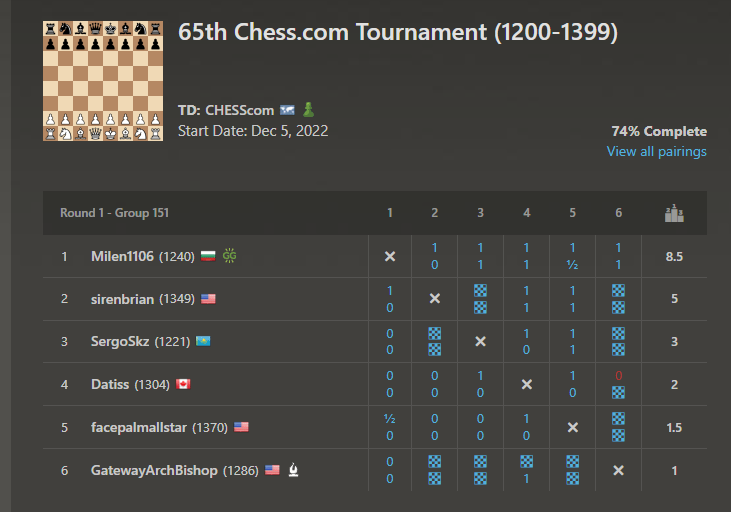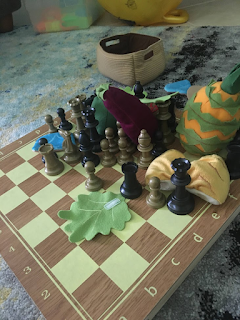My daughter's idea of playing chess: all the pieces get together for lunch.
For a few days there I was feeling quite overwhelmed with chess resources. I'm trying to improve how I play, but I was caught between a bunch of ideas and resources I had found. After my run of blitz games on chess.com a couple of months ago I've actually played very few real games against people; I think I'm spending too much time studying!
I'll start with my conclusion first, if you want the short version.
I'm doing (or at least trying to) the following each day
- One, perhaps two, 15 minute-per-side games on lichess.org. If you play you MUST analyse the game afterwards. (I played a nice one last night!). (Got this advice from Chessvibes on youtube)
- A ten-minute tactics run on aimchess.com. I usually get 18-20 right. Around #12 is where I usually slow down and have to reaaalllly think.
- Do problems from the Polgar "5334 Problems" book. They're all mate in one/two puzzles, but it comes highly recommended. Write down your answers, do the problems in your head even if you're using a physical board. I made a spreadsheet to track my answers.
- Do tactics training on chessable.com; despite not grooving with the opening training there yet I'm enjoying the "On The Attack" (pawns/bishops/rooks/knight/queen) series of free courses. After seeing the same puzzle a few times I'm solving them very quickly; I hope this will translate into seeing them in games too.
- I haven't started this regularly yet but I'm planning to combine information from chessable openings courses and using the chess.com "openings practice" feature. It sets up the board with the opening you desire, then you play against the AI of whatever strength you want, and the eval bar / lines will show you if your moves are "right" or not. This works better for me because you get to take back moves and go down different branches on-the-fly. I think I'll learn more this way, but that remains to be seen. I'll use the chessable courses to tell me which opponent moves I need to be prepared for, but I'll decide how deep into the lines I'll try to learn.
I'm trying to change my openings to something that makes better use of my supposed skills in tactics: my London/Slav are very positional and rigid and don't lead to many tactics. My friend Matt suggested the Scotch for white and Scandinavian with Qd8 for black and I'm enjoying both already.
--
I'm currently under the sway of
Adult Chess Improver and Andras Toth (
video 1). The first advocates not studying openings to any serious depth: you should know the basics/goals of the first couple of moves, but its more important to play solid, principled chess, not try to memorize multiple lines to 15 moves each. Check out his videos in the link there, he explains it very well.
Toth is looking for beginner's to know enough about an opening to recognize a non-book move when they see it, and know how to to punish it (
video). He dislikes timid play when aggression is called for and also despair's of beginner's "material first" mindset. I know why we do that - it's much easier to track material and know "I've got more firepower than my opponent" vs "I'm willing to lose a piece to get a better position" because I don't trust my skills to be able to judge a "good position" yet.
Both recommend, like almost everyone does, getting good at tactics!
My current stats are:
puzzles/tactics: chess.com 2400, lichess.org 1900
rapid games on lichess.org 1400
blitz/bullet: 900 on chess.com
--
Web Sites
- Chess.com for playing games against people and bots, plus lessons, daily tactics and puzzles (both "timed + gradually increasing in difficulty" versus "untimed and difficult")
- Aimchess.com for tactics training and general chess training. It has a neat feature where it analyses your games on lichess and chess.com and finds where you made a mistake, presenting it to you as a puzzle. It has a range of puzzle types and lessons including some I hadn't seen before, like "find the bad move in this sequence of moves". My favorite feature here is the "do as many tactics puzzles in ten minutes as you can; three wrong and you're out"
- Chessable.com has training courses which work by rehearsing/practicing "the correct move" over and over again until you have it memorized. I signed up for lots of free courses including tactics and openings I play (London, Slav, French to start then more recently Semi-Slav, Scandinavian, Italian, Scotch)...the trouble is that these courses don't work for me! I try to push through them too quickly and the opponent's "correct" moves all blur together into a fog. I wasn't learning the right responses to the opponent's moves and was just guessing my way through the quizzes. Not their fault; I'm just not ready for that level of detail yet, I think. My opponents tend not to play that many "correct" moves in a row - chessable's default free option makes you learn lines all the way through; if you pay then you can have LESS depth in the lines, which is an interesting paradox :)
- Chesscup.com for a daily quick 3 minute and 5 minute tactics exercises.
- lichess.org For playing games against real people and doing puzzles/lessons. The tactics competitions there are amazing - the other people seem SO good at them! My favorite feature here is that I can get computer analysis of all my games for free, not just one per day as chess.com does.
I haven't yet walked through any master level games, though most resources I read said that is important. I'll get there at some point.
YouTube Svengalis That Mess With Your Head
Adult Chess Improver Luka says with simple principled play you can get very far with chess. Don't get hung up studying and memorizing openings - game analysis will show you are probably not losing games in the opening! There's is a BIT of learning to do, and he illustrates that with the Italian game.
Another key idea for training is to have a go-to set of difficult puzzles, say 100 of them. Aim to solve them from start to finish TEN times. You will be training your long term memory and pattern recognition. This is different to going to puzzle web sites where you see different puzzles every time. Both methods have purpose: you use the first to build your skills to use in helping with the second.
Chess Vibes - I LOVE his teaching videos.
This list covers "why you're stuck at rating X" - it's usually blunders :) This other list is his
tactics/strategy collection and will give you a lot of basic skills - 35 top principles, 10 uses for your bishops etc. It's a lot of rules-of-thumb stuff that is the bread and butter of chess.
Books
I found many podcasts, websites and other resources that recommended books - here's the ones that everyone seemed to agree on.
Sillman Endgames - you start with the first couple of chapters only and read on as you improve. Start with ladder mates, queen + king, rook + king and get gradually more complex. Everyone seems to pick this book!


